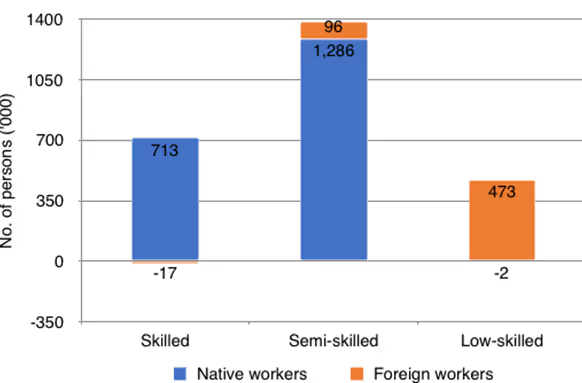
A careful review of the evidence shows that foreign workers are unlikely to have negatively affected short term labour market outcomes in Malaysia. However, for Malaysia to successfully transition into a developed economy, it will need to reduce its dependence on this low-cost structure.
Any comprehensive understanding of the Malaysian economy must include a critical assessment of the impact of foreign workers. Discussions on the economic impact of foreign workers are wrought with contentions. Public discussion on this issue is typically negative, with concerns of foreign workers taking job opportunities away and suppressing wages for Malaysians. On the other hand, existing empirical research on this issue have generally been positive, finding no strong evidence of large negative economic impacts.
This situation is not unique to Malaysia. Many studies have highlighted the disconnect between public perceptions on foreign workers and findings by economists. Thus, an informed understanding is necessary; as a highly political issue, ill-informed perceptions can undermine meaningful policy discussions on immigration.
Foreign workers do not directly affect employment opportunities and wages of Malaysians because they occupy very different economic spaces from Malaysians, and therefore do not directly compete with Malaysians. Foreign workers primarily occupy unskilled jobs while Malaysians mainly take on semi-skilled and skilled occupations. The 2 million Malaysians employed between 2010 and 2017 were all in semi-skilled and skilled jobs. In contrast, for the 570 thousand foreign workers employed in the same period, 80 percent received unskilled jobs.
Malaysians and foreign workers occupy different employment spaces, therefore rarely directly compete for jobs.

Not only do foreign workers rarely compete with Malaysians for jobs, evidence indicates that some Malaysian workers may in fact benefit from the presence of foreign workers. A [AN1] World Bank study reveals how older male Malaysian workers with secondary education in low-skilled services, agriculture, and mining benefitted the most from foreign workers. Unskilled foreign workers freed up these overqualified local workers to take on jobs in more skilled occupations, some of which are complementary (e.g. managerial positions overlooking foreign workers). In addition, foreign workers also lead to greater demand for goods and services, thus contributing to greater economic activity in Malaysia.
Although evidence implies that the overall impact of foreign workers is relatively benign, there is still a small proportion of least educated Malaysians who are disadvantaged by the presence of foreign workers. As direct competitors for unskilled jobs, this sub-section of the Malaysian population is faced with both job displacement and wage suppression.
The long-term impact of foreign workers is also uncertain. The easy access to large numbers of unskilled workers have potentially dangerous consequences for the structural transformation of the Malaysian economy. In our study, we find that industries with increased reliance on foreign workers are associated with lower investment in technology. Long-term dependence on this low-cost structure of foreign labour detracts from investment in innovation and high-skill work, potentially slowing down our development towards a high-income nation.
This is not a trivial concern; the economic well-being of future generations hinges on how Malaysia overcomes these structural challenges, and transitions towards an advanced economy. We explore this topic in our next – and final – article.














